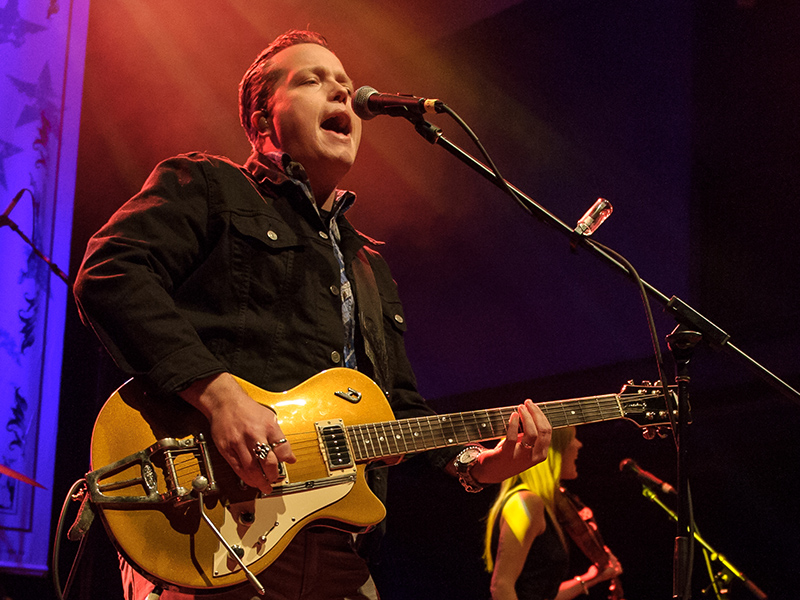For six years, Jason Isbell was drunk at every show he played.
During his tenure with beloved Southern rockers Drive-By Truckers, Isbell planned his drinking to keep him on his feet for the duration of the band’s marathon live shows – barely.
 “I had it timed where, by the very end of the show, I’d done just about all I could do standing up,” he told NPR in 2013. “I knew I needed two or three before I went on, and then during the show, we’d just pass a bottle around between the band.” The routine totaled about a fifth of Jack Daniels per show.
“I had it timed where, by the very end of the show, I’d done just about all I could do standing up,” he told NPR in 2013. “I knew I needed two or three before I went on, and then during the show, we’d just pass a bottle around between the band.” The routine totaled about a fifth of Jack Daniels per show.
And Jack and Jason didn’t get along well: “Some people get drunk and become kind of sweet,” Patterson Hood, Drive-By Truckers founder and singer-songwriter, told The New York Times Magazine in 2013. “Jason wasn’t one of those people.” It didn’t help that the younger Isbell, a virtuoso guitarist with a proclivity for fast and fiery licks, was also a stellar songwriter, whose finely wrought and frequently heartbreaking character sketches were obviously on par with those of the older and principal Truckers, Hood and guitarist/singer-songwriter Mike Cooley. Isbell, who also managed to marry and divorce then-Truckers bassist Shonna Tucker during his time with the band, left in 2007. At the time, it was portrayed as amicable; in 2013, Isbell revealed he’d been forced out, mostly because of his drinking.
After his dismissal from DBT, Isbell went off the rails a little bit. He was arrested for public drunkenness and at one point accused Dierks Bentley of plagiarizing one of his songs on Twitter. He knew he needed help, and told his then-girlfriend, fellow musician Amanda Shires, he had to go to rehab. Unfortunately, both times he said it, he was drunk. “I only got to do that twice, I think,” he told NPR. The second time, Shires told him, “You’re telling the wrong person.”
Isbell got the message, and in February 2012, spent two weeks in Cumberland Heights, a rehab center in Nashville. Coming out, he started playing live again, dropped 40 lbs. and started writing the songs that would make up 2013’sSoutheastern. That September, Isbell’s song “Alabama Pines” won song of the year at the Americana Music Awards, kick-starting a wave of critical appreciation that Southeastern built upon when it was released in July 2013. The album contains Isbell’s most-streamed song on Spotify, “Cover Me Up,” and the devastating “Elephant” – coined by one music writer as “the saddest song of the millennium” – a quiet ballad about a cancer patient that concludes, “no one dies with dignity.”
Isbell toured steadily behind Southeastern, backed by a crack band named the 400 Unit – after the psychiatric ward of a hospital near Muscle Shoals, Alabama, where Isbell grew up – that included his now-wife Shires. (“She has a big conscience, a big heart,” he told Rolling Stone in 2013. “Essentially, she’s just a good person.”)
Southeastern was rewarded with a near-sweep at the 2014 Americana Music Awards that saw Isbell take the honors for album, song (“Cover Me Up”) and artist of the year. But none of that weighed on his mind when he returned to the studio for his follow-up, 2015’s Something More Than Free. “I have so many people ask me… ‘Did you feel pressure to follow up Southeastern?” Isbell told Stereogum in 2015. “That same question every damn time! No, that’s not an actual problem to have. I know people who can’t pay their f—ing bills. Following up a successful piece of work with another piece of work is the most ridiculous first-world problem I can think of.”
Sure enough, Something More Than Free was a mature, confident continuation of the work Isbell started with Southeastern. Anchored by the stellar lead single, “24 Frames,” it debuted at No. 1 on Billboard‘s Top Rock, Top Country Albums and Top Folk Albums charts, and No. 5 on the Billboard200. By way of comparison, Southeastern peaked at No. 23 on the Billboard200.










